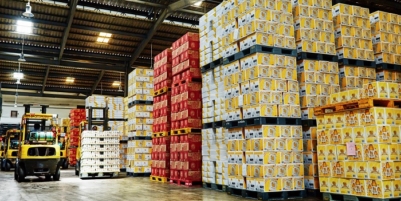-
BLACKOUT TECHNOLOGIES TARGETS TELEMATICS-INTEGRATED MOBILE DEVICE BLOCKING TO COMBAT SMARTPHONE DISTRACTION - 2 days ago
-
OpenADR Alliance announces first OpenADR 3.0 certified products with EVoke Systems, E.ON Energy and Universal Devices - March 25, 2025
-
Growing fulfilment and contract packer appoints new Managing Director - March 25, 2025
-
When is it time to invest in a WMS? Understanding the key trigger points - March 25, 2025
-
eCapital helps Vantage Recruitment on its journey to financial success - March 24, 2025
-
Hugo Beck Celebrates 70 Years of Packaging Innovation with Open House Events - March 20, 2025
-
PROLOG FULFILMENT SUPPORTS LUNA DAILY’S COMMITMENT TO BETTER BODY CARE FOR ALL WOMEN - March 19, 2025
-
Motion Ventures launches largest-ever maritime tech fund at $100M to meet the industry’s new pace of adoption - March 18, 2025
-
ITD GLOBAL APPOINTS GROUP CHIEF REVENUE OFFICER - March 17, 2025
-
SURECAM TEAMS UP WITH ENTERPRISE FLEX-E-RENT FOR VEHICLE REPAIR & MAINTENANCE CONFERENCE - March 14, 2025
Gaps still exist in finding the right kind of supplier, but these can be effectively addressed – Bidvest International Logistics.
There simply is no understating the value of procurement professionals to a business.
As the teams responsible for securing suppliers, they actively put their companies in a more competitive position to make them sustainable both in the short and long term. In many respects, procurement is viewed as the quintessential facilitator of business strategy.
In South Africa, the need for effective procurement has never been greater.
The country is emerging from more than a decade of destructive graft, and while President Cyril Ramaphosa has a lot of work to do in terms of regaining public trust, there are strong indications that government hopes to work with the private sector to rebuild state enterprises for the good of the country.
For example, the Transnet National Ports Authority is now becoming an independent subsidiary of Transnet, a move that paves the way for greater synergy between the public sector and private enterprise, particularly in respect of procurement and supply chain management systems.
The maritime business community has roundly welcomed the decision, saying the subsidiary would create more opportunities for previously-marginalised smaller businesses.
Government’s new, more trade-focused approach presents a golden opportunity for businesses to work more closely with the state while enhancing their own operations and reputations in the process.
Global transport and logistics company Bidvest International Logistics (BIL) is well versed in procurement and tendering, boasting an international network of 250 offices in 120 countries.
As such, the company is able to offer expert advice to businesses hoping to enhance their existing strategies.
Procurement is a multi-faceted undertaking, as BIL’s team of experts explains.
Willem Bekker, BIL’s supply chain solutions manager, says from the outset, it is important to relay operational or business requirements to a procurement team in a way that allows it to translate these requirements into a request for tender.
“Procurement teams need to be fully in tune with the needs not only of the division or department, but the business as a whole. Finding a supplier that fits with the division or department’s vision and helps them reach their strategic goals is essential,” Bekker says.
In the view of BIL’s national commercial manager, Lodi Borstlap, there are four distinct challenges that need to be met, namely: allowing poor quality for lower costs; the provision of unclear specifications and requirements; not undertaking supplier assessments; and not fully understanding supplier capabilities.
“There are ways to overcome these challenges. For example, the use of consumer feedback is helpful in striking a better balance, especially where an acceptable profit margin is reached,” he says.
“Providing clear details or specifications of what your organisation requires also goes a long way in solving the procurement problem. Implementing proper evaluation strategies and assessments both prior to and after selecting the supplier is another way to produce positive results.”
Both Bekker and Borstlap believe operations teams or those doing the work on a day-to-day basis are best placed to brief a company on procurements.
Among their tips for briefing procurement teams effectively are:
- Communicate full scope of work in person by means of an initial workshop of brain-storming session;
- Do not rush procurement processes due to tight deadlines – it can end up costing you dearly;
- Gain buy-in and explain the purpose, aim and goal that the business is looking for long-term improvement and gains, not a short-term win;
- Involve all internal parties from the onset, not just the finance department (operations, commercial, national functions, Human resources and Information Technology (IT);
- Ensure full alignment in the company’s overall business goals, and how the supplier fits into the process of achieving these goals;
- Ensure full alignment on the expected output/deliverables of the process; and
- Be clear on timelines, and manage these tightly.
This aspect is only part of the process, however, as there is still the all-important matter of submitting an attractive tender.
For Rhett Oertel, BIL’s head of sales, it is critical that the tenderer understands what the objectives of the tenderee are, by asking questions related to the purpose in going out to tender, to understand whether the tenderee is motivated by price, service or product offering.
“Once you know what the tenderee needs you are positioned to strategise as a team and determine how you’ll meet those requirements and structure an excellent submission. ”
Oertel is also a great believer in looking at things from the tenderer’s perspective.
“The tenderee also needs to have a clear understanding of the reason for going out to tender. Is it to reduce costs or rates? Are they looking for alternatives in the market because of corporate governance requirements. Or are they looking for a new solution or offering? Once a team is aligned regarding the ‘why’ they will be able to drill down into the details, consider bids objectively and ensure that a decision is made that everyone can be confident in because the winning bid has met the criteria and will lead to key objectives being met.
When responding to a tender, Oertel suggests that the operational aspects of a tender be drawn up by the operations or logistics team.
“These will then need to be mapped against the current business processes to ensure that all aspects are covered. Once this is done, include the procurement and finance teams to ensure that their interests are covered and to ensure that the tender is thorough and complete.”
In terms of finding the best possible supplier, BIL supply chain solutions engineer Ishan Hutheram says businesses should always look for those that stand out for their innovation and willingness to go the extra mile.
BIL suggests the quality of a procurement team’s find can be evaluated on several criteria:
- Measure the performance of the supplier on value, and not just cost;
- Allow the supplier to also provide feedback on the process and success of the business relationship;
- Measure compliance of the supplier to the original proposal;
- Customer satisfaction;
- Supplier lead times;
- Continues Improvement; and
- Vendor or supplier availability, flexibility and consistency.

































